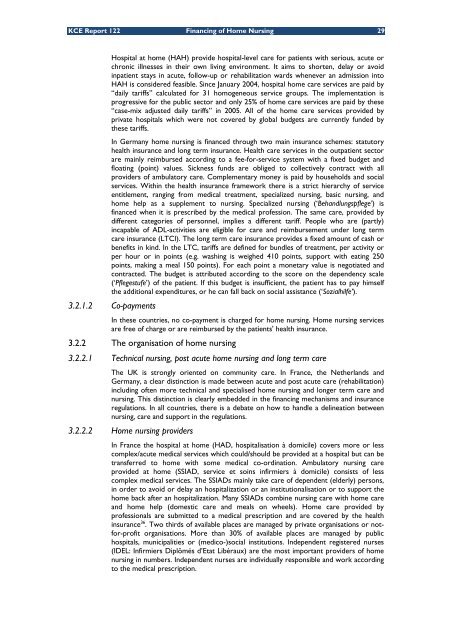Le financement des soins infirmiers à domicile en Belgique - KCE
Le financement des soins infirmiers à domicile en Belgique - KCE
Le financement des soins infirmiers à domicile en Belgique - KCE
Create successful ePaper yourself
Turn your PDF publications into a flip-book with our unique Google optimized e-Paper software.
<strong>KCE</strong> Report 122 Financing of Home Nursing 29<br />
Hospital at home (HAH) provide hospital-level care for pati<strong>en</strong>ts with serious, acute or<br />
chronic illnesses in their own living <strong>en</strong>vironm<strong>en</strong>t. It aims to short<strong>en</strong>, delay or avoid<br />
inpati<strong>en</strong>t stays in acute, follow-up or rehabilitation wards wh<strong>en</strong>ever an admission into<br />
HAH is considered feasible. Since January 2004, hospital home care services are paid by<br />
“daily tariffs” calculated for 31 homog<strong>en</strong>eous service groups. The implem<strong>en</strong>tation is<br />
progressive for the public sector and only 25% of home care services are paid by these<br />
“case-mix adjusted daily tariffs” in 2005. All of the home care services provided by<br />
private hospitals which were not covered by global budgets are curr<strong>en</strong>tly funded by<br />
these tariffs.<br />
In Germany home nursing is financed through two main insurance schemes: statutory<br />
health insurance and long term insurance. Health care services in the outpati<strong>en</strong>t sector<br />
are mainly reimbursed according to a fee-for-service system with a fixed budget and<br />
floating (point) values. Sickness funds are obliged to collectively contract with all<br />
providers of ambulatory care. Complem<strong>en</strong>tary money is paid by households and social<br />
services. Within the health insurance framework there is a strict hierarchy of service<br />
<strong>en</strong>titlem<strong>en</strong>t, ranging from medical treatm<strong>en</strong>t, specialized nursing, basic nursing, and<br />
home help as a supplem<strong>en</strong>t to nursing. Specialized nursing (‘Behandlungspflege’) is<br />
financed wh<strong>en</strong> it is prescribed by the medical profession. The same care, provided by<br />
differ<strong>en</strong>t categories of personnel, implies a differ<strong>en</strong>t tariff. People who are (partly)<br />
incapable of ADL-activities are eligible for care and reimbursem<strong>en</strong>t under long term<br />
care insurance (LTCI). The long term care insurance provi<strong>des</strong> a fixed amount of cash or<br />
b<strong>en</strong>efits in kind. In the LTC, tariffs are defined for bundles of treatm<strong>en</strong>t, per activity or<br />
per hour or in points (e.g. washing is weighed 410 points, support with eating 250<br />
points, making a meal 150 points). For each point a monetary value is negotiated and<br />
contracted. The budget is attributed according to the score on the dep<strong>en</strong>d<strong>en</strong>cy scale<br />
(‘Pflegestufe’) of the pati<strong>en</strong>t. If this budget is insuffici<strong>en</strong>t, the pati<strong>en</strong>t has to pay himself<br />
the additional exp<strong>en</strong>ditures, or he can fall back on social assistance (‘Sozialhilfe’).<br />
3.2.1.2 Co-paym<strong>en</strong>ts<br />
In these countries, no co-paym<strong>en</strong>t is charged for home nursing. Home nursing services<br />
are free of charge or are reimbursed by the pati<strong>en</strong>ts' health insurance.<br />
3.2.2 The organisation of home nursing<br />
3.2.2.1 Technical nursing, post acute home nursing and long term care<br />
The UK is strongly ori<strong>en</strong>ted on community care. In France, the Netherlands and<br />
Germany, a clear distinction is made betwe<strong>en</strong> acute and post acute care (rehabilitation)<br />
including oft<strong>en</strong> more technical and specialised home nursing and longer term care and<br />
nursing. This distinction is clearly embedded in the financing mechanisms and insurance<br />
regulations. In all countries, there is a debate on how to handle a delineation betwe<strong>en</strong><br />
nursing, care and support in the regulations.<br />
3.2.2.2 Home nursing providers<br />
In France the hospital at home (HAD, hospitalisation <strong>à</strong> <strong>domicile</strong>) covers more or less<br />
complex/acute medical services which could/should be provided at a hospital but can be<br />
transferred to home with some medical co-ordination. Ambulatory nursing care<br />
provided at home (SSIAD, service et <strong>soins</strong> <strong>infirmiers</strong> <strong>à</strong> <strong>domicile</strong>) consists of less<br />
complex medical services. The SSIADs mainly take care of dep<strong>en</strong>d<strong>en</strong>t (elderly) persons,<br />
in order to avoid or delay an hospitalization or an institutionalisation or to support the<br />
home back after an hospitalization. Many SSIADs combine nursing care with home care<br />
and home help (domestic care and meals on wheels). Home care provided by<br />
professionals are submitted to a medical prescription and are covered by the health<br />
insurance 36 . Two thirds of available places are managed by private organisations or notfor-profit<br />
organisations. More than 30% of available places are managed by public<br />
hospitals, municipalities or (medico-)social institutions. Indep<strong>en</strong>d<strong>en</strong>t registered nurses<br />
(IDEL: Infirmiers Diplômés d’Etat Libéraux) are the most important providers of home<br />
nursing in numbers. Indep<strong>en</strong>d<strong>en</strong>t nurses are individually responsible and work according<br />
to the medical prescription.

















